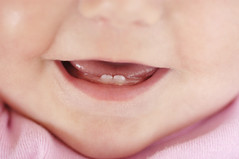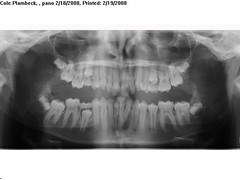 Humans have two different sets of teeth throughout the lifetimes. The first set consists of 20 teeth, whereas the set that they obtain later and have for most of their lives consists of 32 teeth. The primary distinction made between these teeth is at what point of their lives people have them.
Humans have two different sets of teeth throughout the lifetimes. The first set consists of 20 teeth, whereas the set that they obtain later and have for most of their lives consists of 32 teeth. The primary distinction made between these teeth is at what point of their lives people have them.
What are Baby Teeth?
Baby teeth comprise the first set of teeth that people have, and they are termed such because they are the teeth that people get when they’re babies. Although baby teeth don’t tend to emerge from the gum until babies are at least six months old, they begin forming much sooner than that. In fact, the first stage of baby teeth formation actually begins when the fetus is only six weeks old. The baby teeth consist of four second molars, four first molars, four cuspids, four lateral incisors and four central incisors.
Development of the Baby Teeth
When the fetus is approximately six weeks old, the basic substance of the tooth begins to form. Around three to four months after gestation, the hard tissue that surrounds the teeth begins to form. After the baby is actually born, the next stage of tooth development occurs at approximately six months when the baby’s teeth begin to protrude from the gum. The last stage of the baby teeth can begin at ages 5 or 6 and last all the way up until ages 12 or 13 when they erupt and then begin to fall out in order to be replaced by permanent teeth, which are the teeth most adults will have for the rest of their lives.
The Importance of Baby Teeth
Baby teeth are important because they not only provide babies with chewing and speaking power, but they also help pave the way for a healthy adult smile. Small spaces between baby teeth are normal to ensure there’s ample room for permanent teeth to come in later on. Baby teeth essentially hold the space for permanent teeth to develop, so making sure they stay healthy is important to preserving future permanent teeth. For instance, if a baby tooth becomes decayed and has to be removed, then other teeth can drift inwards and block the permanent tooth from coming in and can cause it to misalign.
Caring for Baby Teeth
 Protecting baby teeth consists of utilizing good oral habits and keeping a regular check on the development of the teeth by going to the dentist. Parents can begin caring for their baby’s teeth by wiping the baby’s gums with a wet gauze after feedings to keep them healthy and free of cavities. Once the actual teeth appear, brush them twice a day with a soft toothbrush. Many children won’t be able to fully brush their own teeth until they’re six or seven years old. Yearly checkups and dental cleanings can also help parents stay informed of how their children’s baby teeth are developing.
Protecting baby teeth consists of utilizing good oral habits and keeping a regular check on the development of the teeth by going to the dentist. Parents can begin caring for their baby’s teeth by wiping the baby’s gums with a wet gauze after feedings to keep them healthy and free of cavities. Once the actual teeth appear, brush them twice a day with a soft toothbrush. Many children won’t be able to fully brush their own teeth until they’re six or seven years old. Yearly checkups and dental cleanings can also help parents stay informed of how their children’s baby teeth are developing.
References:
PubMed Health Glossary “Baby Tooth (Deciduous Tooth). Retrieved on October 9, 2015, from http://www.ncbi.nlm.nih.gov/pubmedhealth/PMHT0023273/.
The United States National Library of Medicine National Institutes of Health
8600 Rockville Pike,
Bethesda MD, 20894 USA
1-888-FIND-NLM
http://www.ncbi.nlm.nih.gov
Images:
https://farm1.staticflickr.com/13/19400983_5f2c5aaa9e_m.jpg
https://farm3.staticflickr.com/2330/2278993902_3b620d966b_m.jpg